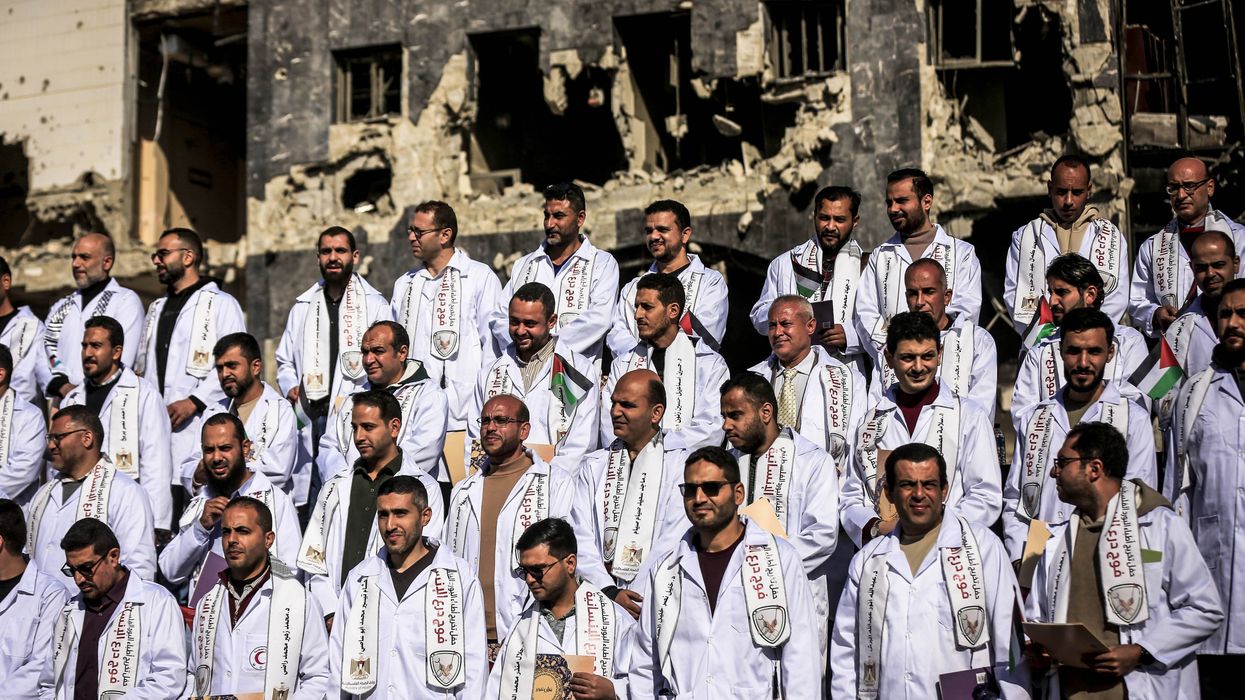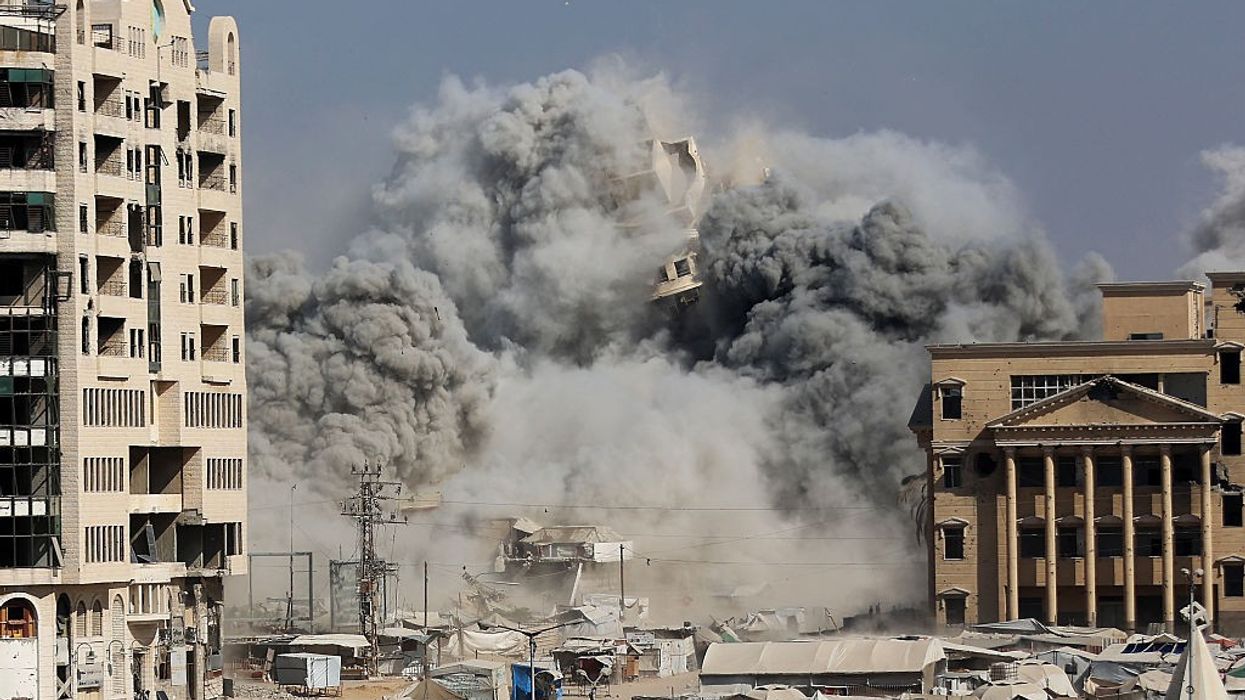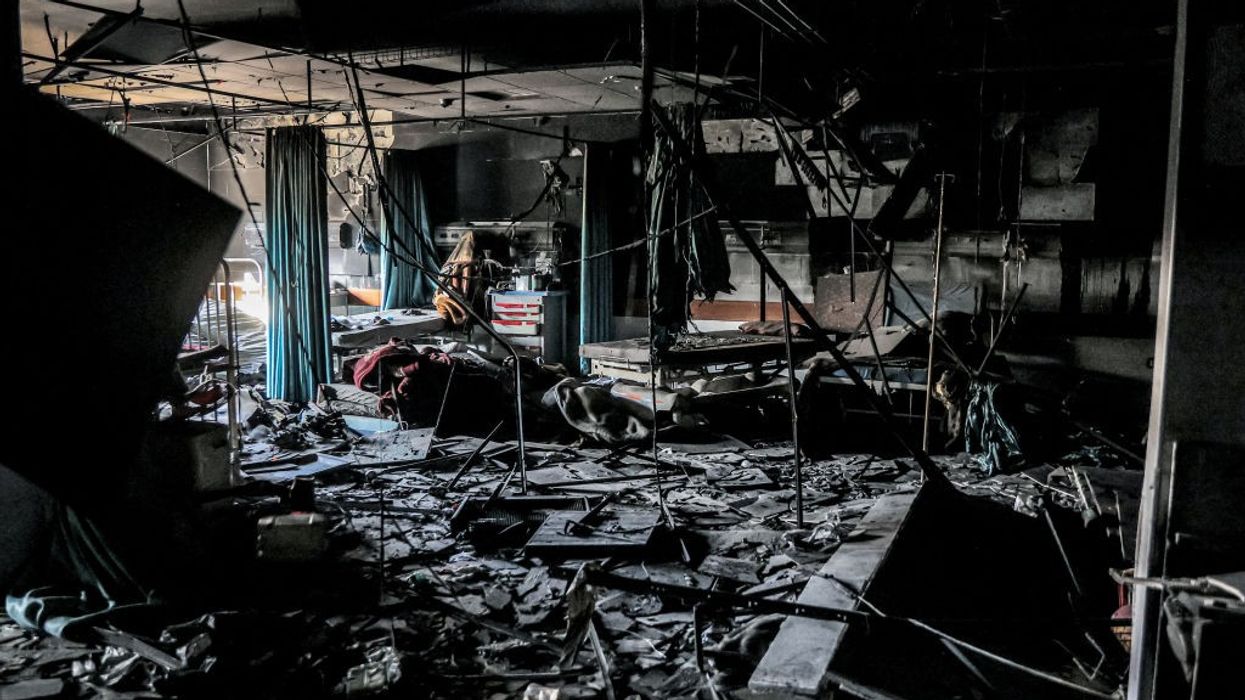'The Humanity Cohort': Med School Graduates Offer Hope in Gaza
Israel has waged a systematic campaign to destroy Gaza’s healthcare delivery and to kill or imprison healthcare professionals, but these 168 students persisted.
On Thursday, December 25, 2025, during Israel’s ongoing genocide against Palestinians, 168 students graduated from medical school, in Gaza. Wearing their white coats, they stood in front of the ruined façade of what was formerly Gaza’s largest hospital, the al-Shifa Medical Complex. As a backdrop, the destroyed building realistically conveys perils the graduates faced while earning their medical degrees. Throughout the last two years of their studies, they risked assassination, injury, arrest, imprisonment, and torture, as well as attacks on their own family members.
Israel has waged a systematic campaign to destroy Gaza’s healthcare delivery and to kill or imprison healthcare professionals. From October of 2023 to October of 2025, The World Health Organization documented 687 Israeli attacks on Gazan healthcare facilities and 211 attacks on ambulances. These attacks killed 985 people. In the same time period, Israel detained over 306 healthcare workers.
Health Care Workers Watch—Palestine, a nongovernmental organization, reports that 95 Palestinian healthcare workers are still in prison, 80 of whom are from Gaza. Prisoners who have been released from detention report that doctors are singled out for particularly brutal treatment.
Among the 80 Gazan healthcare workers who are still detained is the former director of Gaza’s Kamal Adwan hospital, Dr. Hussam Abu Safiya. On December 27, 2025, Dr. Abu Safiya began his second year of imprisonment.
In a better world, in a better future, we can hope that Palestinians graduating from medical school could assemble for an address delivered by Dr. Hussam Abu Safiya.
For over a year, prior to his incarceration, the Israeli military had subjected the Kamal Adwan hospital to repeated sieges and attacks. Dr. Abu Safiya and his staff, refusing to desert their patients, managed to increase the number of available beds in the hospital as theirs became one of the few hospitals still operating in northern Gaza.
On October 25, 2024, Israel raided the hospital, bombing its buildings, detaining many patients, and arresting all hospital staff, including Dr. Abu Safiya who was interrogated and released. On that same day, an Israeli drone attacked one of the hospital buildings and killed Dr. Abu Safiya’s 20-year-old son, Ibrahim. Dr. Abu Safiya buried his son on the hospital grounds and still refused to abandon the patients.
“The Israeli army does not know what it wants,” Dr. Abu Safiya told a reporter with the Electronic Intifada. “They detained me for a few hours and interrogated me about whether there were fighters inside the hospital, and demanded that I evacuate the hospital completely, but I refused and assured them that there were only patients inside the hospital. But 57 of the hospital’s medical staff were arrested... So we are suffering from a severe shortage of doctors, especially surgeons. Right now, we only have pediatricians—it is a huge challenge to work under these circumstances. I refused to leave the hospital and sacrifice my patients, so the army punished me by killing my son. I saw him die at the entrance gate—it was a great shock. I found a grave for him near one of the hospital’s walls, so that he could stay close to me.”
On December 27, 2024, when Israeli forces threatened to level the whole facility, Dr. Abu Safiya agreed to leave the hospital which was, by then, largely inoperable. An iconic video shows him, clad in his white coat, walking through the rubble toward two Israeli tanks.
He was held incommunicado, and then taken to the Sde Teiman prison, in the Negev desert, where he was interrogated and beaten before being transferred to the Ofer prison. There, he is held in solitary confinement. Only his lawyer has been allowed to visit him. She expresses rising alarm over his weight loss, inadequate healthcare, and frequent beatings.
Amnesty International says he has been forcibly disappeared and arbitrarily held without charge. Even though no charges have been brought against him, an Israeli court has extended his detention multiple times. On October 16, 2025, Israel’s Be'er Sheva District Court added an additional six months to his detention.
Who are the criminals? Israel and its partner, the United States, egregiously flaunt international law, committing numerous war crimes in the Occupied Palestinian Territory. Dr. Abu Safiya endures daily punishments in return for his courageous dedication to serving victims of war.
In a better world, in a better future, we can hope that Palestinians graduating from medical school could assemble for an address delivered by Dr. Hussam Abu Safiya. Together, they could uphold “the Humanity Cohort,” as the Gazan doctors who graduated in December 2025 call themselves, and safely commemorate the courageous healthcare workers who risked and lost their lives to care for patients during an Israeli genocide that is still ongoing. Confident that healthcare is never a crime, they could cite their fallen colleagues' historic and extraordinary adherence to the United Nation’s core mission, "to save succeeding generations from the scourge of war.”


